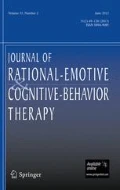Abstract
Developmental theories of career counseling conceptualize individuals proceeding in a sequential, orderly fashion throughout their career lives. Specific tasks are confronted and resolved as individuals pursue their career goals. Issues faced by women at each stage of the career cycle are often overlooked. This article describes the negative influence societal demands, role conflicts, and individual attitudes can have on women seeking careers. RET provides an essential cognitive component for reducing the internal and external attitudinal barriers in treating women for job related problems.
Similar content being viewed by others
References
Block, J. (1978). Effects of a rational-emotive mental health program on poorly achieving disruptive high school students.Journal of Counseling Psychology, 25, 61–65.
Brooks, L. (1976). Supermoms shift gears: Re-entry women.The Counseling Psychologist, 6(2), 33–36.
Bryant, G. (Ed.). (1984).The working woman report succeeding in business in the 80's. New York: Simon and Schuster.
Ciabattari, J. (1986). Seven stages of a woman's career.Working Woman, Dec, 84–87, 121–127.
Cramer, S.J., Wise, P.S., & Colburn, E.D. (1977). An evaluation of treatment to expand the career perceptions of high school girls.The School Counselor, 25, 125–129.
Criddle, W., & Tracy, J. (1977). Rational skills for business people. In J.L Wolfe & E. Brand (Eds.),Twenty years of rational therapy (pp. 209–219). New York:Institute for Rational Living.
Ellis, A. (1985). A rational-emotive approach to acceptance and its relationship to EAPS. In S.H. Klarreich, J.L. Francek, & C.E. Moore (Eds.),The human resources management handbook. New York: Praeger.
Ellis, A. (1972).Executive leadership: A rational approach. New York: Institute for Rational Living.
Ericksen, J.A. (1977). An analysis of the journey to work for women.Social Problems, 24, 428–435.
Ginzberg, E. (1972). Toward a theory of occupational choice: a restatement.Vocational Guidance Quarterly, 20, 169–176.
Holland, J.H. (1966).The psychology of vocational choice. Waltham, Mass: Blaisdell Pub. Co.
Mallary, N.D., Jr., & Conner, B.H. (1975). An example of employment service adjustment counseling.Journal of Employment Counseling, 12, 55–58.
Moore, K. (1975). The cooling out of two-year college women.Personnel and Guidance Journal, 53, 578–583.
Niemi, B. (1973/74). The female-male differential in unemployment rates.Industrial and Labor Relations Review, 27, 331–350.
Oliver, R. (1985). RET and some mid-life problems. In A. Ellis & M. Bernard (Eds.),Clinical applications of rational-emotive therapy (pp. 311–333). New York: Plenum Press.
Richman, D.R. (1979). A comparison of cognitive and behavioral group counseling techniques for job finding with welfare women. Unpublished doctoral dissertation, Hofstra University.
Richman, D.R. (1982). A comprehensive skills program for job-finding with the hardcore unemployed. In R.M. O'Brien, A.M. Dickinson, & M. Rosow (Eds.),Industrial behavior modification; A management handbook (pp. 266–285).
Richman, D.R. (in press). Cognitive psychotherapy through the career cycle. In W. Dryden & P. Trower (Eds.),Developments in Cognitive Psychotherapy. London, England: Sage Publications.
Richman, D.R., & Nardi, T.J. (1985). A rational-emotive approach to understanding and treating burnout.Journal of Rational-Emotive Therapy, 3, 55–64.
Schein, E.M. (1978).Career dynamics: matching individual and organizational needs. Reading, Mass: Addison-Wesley.
Sheehy, G. (1974).Passages. New York: Bantam.
Smith, R.R., Petko, CM., Jenkins, W.O., & Warner, R.W., Jr. (1979). An experimental application and evaluation of rational behavior therapy in a work release setting.Journal of Counseling Psychology, 26, 519–525.
Super, D.E. (1953). A theory of vocational development.American Psychologist, 8, 185–190.
Super, D.E. (1963).Career development: self-concepts theory. New York: College Entrance Examination Board.
Super, D.E. (1957).The psychology of careers. New York: Harper and Bros.
Vincenzi, H. (1977). Minimizing occupational stereotypes.Vocational Guidance Quarterly, 25, 265–268.
Wolfe, J.L. (1985). Women. In A. Ellis & M. Bernard (Eds.),Clinical applications of rational-emotive therapy (pp. 101–127). New York: Plenum Press.
Zaccaria, J.C. (1970).Theories of occupational choice and vocational development. Boston, Mass: Houghton Mifflin.
Author information
Authors and Affiliations
Additional information
Diana Richman, Ph.D. is Supervising psychologist at the Institute for Rational-Emotive Therapy. She maintains a private practice in Manhattan and Queens.
Rights and permissions
About this article
Cite this article
Richman, D.R. Cognitive career counseling for women. J Rational-Emot Cognitive-Behav Ther 6, 50–65 (1988). https://doi.org/10.1007/BF01061065
Issue Date:
DOI: https://doi.org/10.1007/BF01061065



